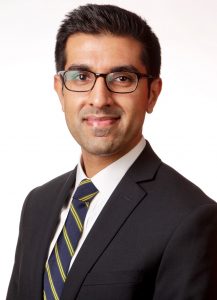
Ramanjot Kang, a fourth-year medical student at the Boonshoft School of Medicine. (Photo by ASCO/Todd Buchanan)
Ramanjot Kang, a fourth-year medical student at the Wright State University Boonshoft School of Medicine, was one of 22 medical students nationwide selected to participate in the American Society of Hematology (ASH) 2017 Minority Medical Student Award Program (MMSAP).
This is the second year that Kang has received the award. He was one of four medical students selected to return to the program with new and/or continuing research.
The ASH program encourages underrepresented minority medical students to pursue careers in hematology by supporting them as they implement their own hematology-related research project in the lab of a research mentor. ASH is the world’s largest professional society of hematologists dedicated to furthering the understanding, diagnosis, treatment and prevention of disorders affecting the blood, bone marrow and the immunologic, hemostatic and vascular systems.
Kang will receive $7,000 to help cover his research projects and travel expenses to the 59th ASH Annual Meeting in December in Atlanta, where he will present his research findings during a special session. He presented his research in December 2016 in San Diego and was recognized with an Abstract Achievement Award.
Kang’s original research project, “The Development of Autoimmune Diseases Following HPA-1a Alloimmunization in Fetal-Neonatal Alloimmune Thrombocytopenia (FNAIT),” focuses on a blood-related disease that affects newborns. During pregnancy, platelets are able to cross the placenta. In some cases, these platelets have antigens, substances that the immune system views as foreign to the mother’s body. Antibodies form, destroying the platelets.
“This incompatibility is referred to as alloimmunization. Studies show that mothers with specific genes are predisposed to developing incompatibilities,” Kang said. “The genes that predispose mothers to developing incompatibilities also are associated with several autoimmune diseases, including type 1 diabetes, systemic erythematous lupus and rheumatoid arthritis.”
Because mothers with specific genes are predisposed to developing FNAIT and those same genes are related to autoimmune diseases, Kang wanted to determine whether there was an increased incidence of autoimmune diseases in mothers with pregnancies affected by FNAIT. Preliminary results showed that mothers with a particular antigen incompatibility, human platelet antigen-1a or HPA-1a, were prone to developing autoimmune diseases when compared with the general population.
“In the current study, we will examine if this finding holds true for other types of platelet incompatibilities,” Kang said. “We will see if mothers that form antibodies against platelets with antigens other than HPA-1a are also predisposed to developing autoimmune diseases.”
Kang has been working with his MMSAP research mentor, James Bussel, M.D., of Weill Cornell Medicine in New York, New York. He also is working with his MMSAP career development mentor, Mukund Dole, a pediatric hematologist-oncologist at Dayton Children’s Hospital and an associate professor of pediatrics at the Boonshoft School of Medicine. During the 2017-2018 academic year, he will work on his research at the Weill Cornell Medical College/New York-Presbyterian Hospital.
“The mentorship experience has helped me learn about the role of research in patient care,” said Kang, who wants to pursue a residency in internal medicine followed by a fellowship in hematology/oncology. “My mentors have helped me narrow down my research interests. They have helped me determine the next steps I need to take as I map out my career.”
Kang, who was born and raised in Queens in New York City, is a first-generation American and the first in his family to finish high school and college. He earned his undergraduate degree in psychology and a graduate degree in biology from New York University.
Despite his interest in medicine, it wasn’t until a family member was diagnosed with cancer that he began to better understand the complex nature of medicine. The experience cemented his desire to pursue a career in medicine. While he was in medical school, another family member’s diagnosis of acute lymphoblastic leukemia piqued his interest in pediatric hematology-oncology.
After he completes a fellowship in hematology/oncology, he would like to work at an academic medical center, dividing his time among research, teaching and patient care.

 Wright State’s Homecoming Week features block party-inspired events Feb. 4–7 on the Dayton Campus
Wright State’s Homecoming Week features block party-inspired events Feb. 4–7 on the Dayton Campus  Wright State music professor honored with Ohio’s top music education service award
Wright State music professor honored with Ohio’s top music education service award  Wright State’s Industrial and Human Factors Engineering program named one of top online graduate programs by U.S. News
Wright State’s Industrial and Human Factors Engineering program named one of top online graduate programs by U.S. News  Student-run ReyRey Café celebrates decade of entrepreneurship at Wright State
Student-run ReyRey Café celebrates decade of entrepreneurship at Wright State  Wright State faculty member Damaris Serrano wins Panamanian literary award
Wright State faculty member Damaris Serrano wins Panamanian literary award 